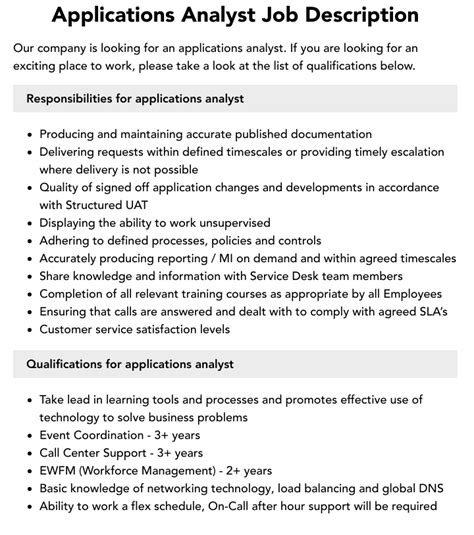The role of an Application Analyst is a vital one in today's technology-driven world. As organizations increasingly rely on software applications to manage their operations, the need for skilled professionals who can analyze, develop, and implement these applications has grown. In this article, we will delve into the job duties and responsibilities of an Application Analyst, exploring the skills and qualifications required for success in this role.
Understanding the Role of an Application Analyst
Application Analysts play a crucial part in ensuring that an organization's software applications meet their business needs. These professionals work closely with stakeholders to identify requirements, design solutions, and implement applications that improve operational efficiency and drive business growth.
Key Job Duties and Responsibilities
The responsibilities of an Application Analyst can vary depending on the organization and the specific role. However, some common duties and responsibilities include:

- Requirements Gathering: Working with stakeholders to identify business requirements and developing technical specifications for software applications.
- Solution Design: Designing and proposing solutions to meet business requirements, including the development of prototypes and proof-of-concepts.
- Application Development: Collaborating with developers to design, develop, and test software applications.
- Testing and Quality Assurance: Participating in testing and quality assurance activities to ensure that applications meet business requirements and are free from defects.
- Implementation and Deployment: Coordinating the implementation and deployment of software applications, including training end-users and providing support.
- Maintenance and Support: Providing ongoing maintenance and support for software applications, including troubleshooting and resolving issues.
Skills and Qualifications
To be successful as an Application Analyst, individuals should possess a combination of technical, business, and soft skills. Some key skills and qualifications include:
Technical Skills
- Programming languages: Proficiency in programming languages such as Java, Python, or C#.
- Software development methodologies: Knowledge of Agile, Scrum, or Waterfall development methodologies.
- Database management: Understanding of database management systems such as Oracle, MySQL, or SQL Server.
- Operating systems: Familiarity with operating systems such as Windows, Linux, or Unix.
Business Skills
- Business acumen: Understanding of business operations and processes.
- Communication: Effective communication and interpersonal skills.
- Project management: Knowledge of project management principles and methodologies.
- Analytical skills: Strong analytical and problem-solving skills.
Soft Skills
- Teamwork: Ability to work collaboratively with cross-functional teams.
- Adaptability: Willingness to adapt to changing business requirements and priorities.
- Time management: Effective time management and organization skills.
- Continuous learning: Commitment to ongoing learning and professional development.
Career Path and Salary Range
The career path for an Application Analyst can vary depending on factors such as industry, location, and level of experience. However, some common career progression opportunities include:
- Senior Application Analyst: Leads a team of Application Analysts and provides technical guidance and oversight.
- Technical Lead: Oversees the technical direction of a project or program.
- Solution Architect: Designs and implements comprehensive solutions that meet business requirements.
- IT Manager: Manages a team of IT professionals and provides strategic direction.
The salary range for an Application Analyst can also vary depending on factors such as location, industry, and level of experience. However, according to data from the United States Bureau of Labor Statistics, the median annual salary for an Application Analyst is around $85,000.
Gallery of Application Analyst Role






FAQ Section
What is the role of an Application Analyst?
+An Application Analyst plays a crucial part in ensuring that an organization's software applications meet their business needs. They work closely with stakeholders to identify requirements, design solutions, and implement applications that improve operational efficiency and drive business growth.
What skills and qualifications are required to be an Application Analyst?
+To be successful as an Application Analyst, individuals should possess a combination of technical, business, and soft skills. Some key skills and qualifications include programming languages, software development methodologies, database management, operating systems, business acumen, communication, project management, analytical skills, teamwork, adaptability, time management, and continuous learning.
What is the career path for an Application Analyst?
+The career path for an Application Analyst can vary depending on factors such as industry, location, and level of experience. However, some common career progression opportunities include Senior Application Analyst, Technical Lead, Solution Architect, and IT Manager.
Conclusion
In conclusion, the role of an Application Analyst is a critical one in today's technology-driven world. These professionals play a vital part in ensuring that an organization's software applications meet their business needs, and their skills and qualifications are in high demand. As technology continues to evolve, the need for skilled Application Analysts will only continue to grow. If you're interested in pursuing a career as an Application Analyst, we encourage you to explore the many resources available to help you get started.
